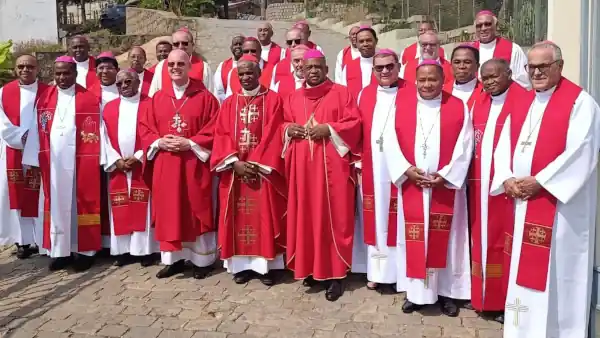19 April - Saint Leo IX, born Bruno of Eguisheim-Dagsburg in Eguisheim on 21 June 1002 and died in Rome on 19 April 1054, is a pope of the Central Middle Ages. Born to the high nobility of Alsace and bishop of Toul, he was appointed pope by the German Emperor and accepted by the clergy of Rome.
At the age of five, he was entrusted to Bishop Berthold of Toul to be educated at the cathedral school where he proved to be very gifted. He was marked by the Gorze reform. After the death of his guardian, he was called to the court of his cousin Conrad II le Salique, who supported the monastic reform. He became a deacon in 1025. On the death of Bishop Hermann of Toul, when he was only 24 years old, he was proposed by the clergy with the support of Conrad as his successor and on 23 May 1026 he was consecrated by Archbishop Poppon of Trier.
During the twenty years of his episcopate, Bruno fought against Nicolaism and simony. He is part of the reform movement promoted by Cluny and Gorze. He recruits his collaborators among the representatives of this movement. It was in 1048 that he noticed Hildebrand (the future Gregory VII) and attached him to him. He imposes a humble and pious way of life on himself and on those around him, behaving like a Benedictine monk and thus setting an example for the abbots of his bishopric. By dint of his energy, he obtained the moral purification of the abbeys of his bishopric. He remained faithful to the emperor and pleaded his cause before Robert the Pious for the succession of the kingdom of Burgundy, where Conrad II, who had inherited from Rudolph III, who died without children, was contested by Eudes of Champagne, who had the support of the Italians. He successfully manages to bring peace between the two sovereigns. His fame largely crosses the borders of Lorraine.
The emperor's authority over his vassals was weak and during the reign of Henry III, the counts of Tusculum came from a powerful Roman family which, used to electing the pope, tried to regain his prerogatives. Criticizing the low morality of the popes appointed by the emperor, she had a rival pope elected, forcing the emperor to intervene militarily, to convene a great council on December 20, 1046 to dismiss the rival popes. But this is not enough, two popes appointed by the emperor are assassinated one after the other (Clement II and Damasus II). Henry III must imperatively appoint a pope whose morality can not be questioned and skillful enough to win the confidence of the Romans. Bruno, after his brilliant ministry in Toul, is the ideal candidate. To be accepted, however, he must not be the candidate designated by the emperor, he goes on pilgrimage to the Holy City and humbly asks the Romans to elect him only if it suits them. He was then enthroned as Leo IX (in memory of Leo the Great, who had affirmed the primacy of the Bishop of Rome as Peter's successor) on 1 February 1049.
Raised in the spirit of the Cluniac Reformation, he concluded that it was the unworthiness of the previous popes that led to their disavowal by the Romans and their disqualification. He considers that the temporal sovereign should not intervene in religious life. As in Toul, he surrounded himself with reformers. Many followed him, such as the monk Humbert de Moyenmoutier, Hugues Candide, Frédéric de Lorraine (the future Etienne IX) or Pierre Damien. He appointed a clunisian, Hildebrand (the future Gregory VII), sub-deacon and put him in charge of the administration of the revenues of the Holy See, which was close to bankruptcy. The governing bodies were reorganised; the services of the chancellery, now very active, followed the imperial model and the role of the cardinals, to whom key administrative posts were entrusted, increased considerably; these functions, previously reserved for the representatives of Roman families, were opened to foreigners, which underlined the universal character of the Holy See and showed that these appointments should no longer be the result of clientelism.
At the beginning of his pontificate, in April 1049, Leo IX convened a council in Rome condemning simony and part of Nicolaism. But the German and French prelates did not come. He then decided to travel throughout Christendom to vigorously defend his reform. From July 1050 to the spring of 1051, from June 1052 to March 1053, he criss-crossed Europe from Benevento in the south, to Cologne in the north, to Rheims in the west, to Bratislava in the east. His main struggles are :
- against the purchase or sale of ecclesiastical offices (simony); ;
- against the concubinage of priests (Nicolaism);
- the bishops were not to be prefects of the Empire, but theologians;
- a return to "more Christian" virtues.
He excommunicated and deposed convicted bishops. During his pontificate he convoked twelve councils. In 1050, he imposed God's truce on the lords who were constantly at war with each other.
Contenu soumis à la licence CC-BY-SA. Source : Article Léon IX de Wikipédia en français (auteurs)








